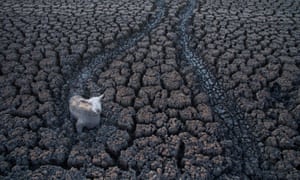Climate change is making the drought in eastern Australia more severe and contributing to the woes of the Murray-Darling river system. However, only around one in 20 news stories about the drought mention climate change.
An analysis of media coverage of the drought was prepared for Guardian Australia by Streem, a media monitoring company. The analysis looked at drought coverage from October 2017 onwards across TV, radio, online and print. Each news story was scored for the occurrence of key phrases [more detail about the methods below].
Overall, the media were more likely to mention financial relief or
assistance funding (7.6%) in news stories than climate change (5.8%).
Since Scott Morrison became prime minister, he was more likely to be
mentioned in a news story (6.4%) than climate change.An analysis of media coverage of the drought was prepared for Guardian Australia by Streem, a media monitoring company. The analysis looked at drought coverage from October 2017 onwards across TV, radio, online and print. Each news story was scored for the occurrence of key phrases [more detail about the methods below].
The mediums least likely to include climate change in news stories were radio (2.5%) and TV (2.6%), with commercial stations particularly low. Channel Nine mentioned climate change in only 0.7% of their news stories about drought, and Channel Seven in only 1.3%.
The influence of climate change on temperature is comparatively more straightforward. Since 1910, Australia has warmed by 1 degree on average. According to Andrew King, a climate scientist at the University of Melbourne, climate change is making droughts worse.
“In general, climate change is exacerbating drought, mainly because in a warmer world we experience more evaporation from the surface, and we project for that to continue in the future,” he says.
“So when it does rain, more of that water is likely to be lost to the atmosphere through evaporation than before human-caused climate change.”
This increased evaporation makes droughts more severe, as it reduces soil moisture available to plants, and also reduces the flow of water into river systems that people rely on for irrigation and drinking water, as well as reducing the water available for river and wetland ecosystems.
David Holmes is the director of the climate change communication research hub at Monash University, and has conducted similar studies of media coverage.
Holmes says that coverage of extreme weather trends tends to get overtaken by several common narratives that push climate change out of the story.
“The first is the ‘triumph over tragedy’ narrative, which is all about how people are doing it tough, but they’re a resilient bunch and work out ways to overcome adversity,” he says.
“The second most dominant narrative is the ‘unstoppable power of nature’, so we’re at the mercy of natural forces. With drought, it’s tied to a narrative where there’s always been a changing climate and droughts, so let’s not try and make it some unique thing, let’s just work out how to adapt.”
Holmes says these and other narratives often shift climate change out of the analysis and can naturalise or bury the amplifying effects of climate change in extreme weather events.
As to whether the media should be making the link between extreme weather events and climate change more frequently, Holmes suggests that people should be informed by the science where possible.
“Find the experts that deal with drought and allow the scientists to make the link,” he suggests.
“The best time to talk about [climate change] is during extreme weather events because people want to know what is going on.”
Notes
Analysis of media coverage combined the following search term “Drought AND (Australia OR Australian OR “New South Wales” OR Victoria OR Queensland OR Tasmania OR “South Australia” OR “Northern Territory” OR “Western Australia” OR NT OR SA OR WA OR NSW OR ACT)“ with other phrases: “climate change”, emissions, “climate change” OR emissions, “rainfall patterns”, “drought relief” OR “financial assistance”, livestock OR cattle OR sheep, “Scott Morrison”, “Michael McCormack”.It is entirely possible that some stories will not be about the current drought, but instead will be using the term in a more general sense (eg man drought).
Coverage is from October 2017 onwards.

No comments:
Post a Comment